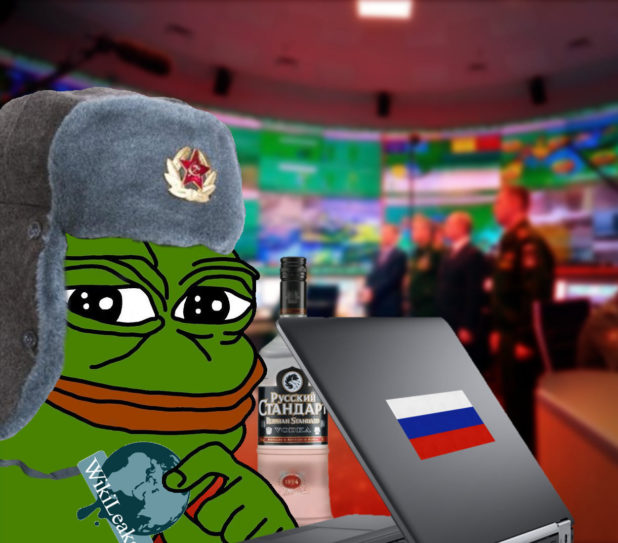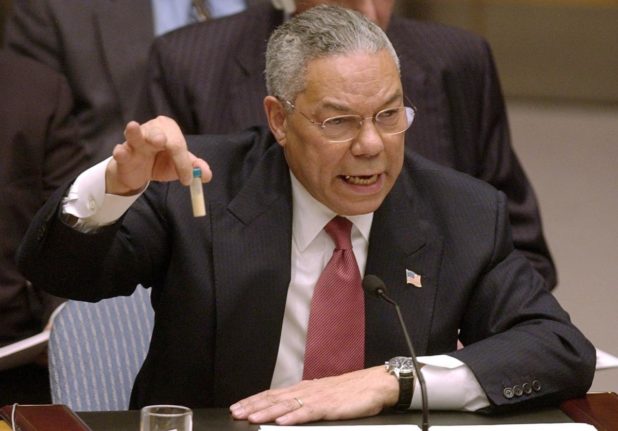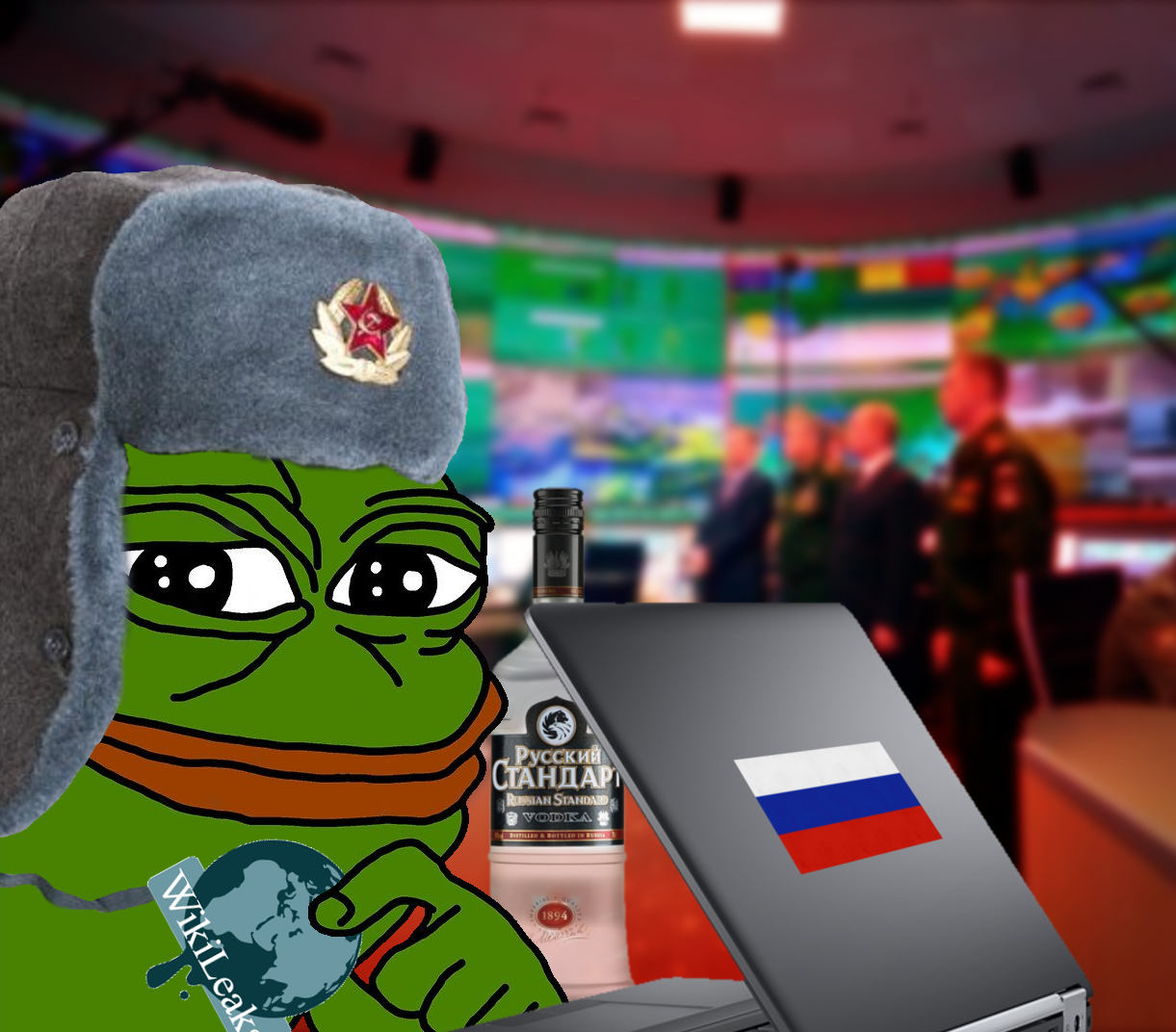Zeiger
Daily Stormer
January 7, 2017

Pepe hacked the election. What you didn’t know was that Pepe is a Russian agent.
The establishment has trotted out it’s final weapon before Trump is elected. It’s unclear what they intend to do with it at this point, a mere two weeks before Trump steps into office, but the intention is clearly to step up tensions with Russia.
CNN:
The US intelligence community concluded in a declassified report released Friday that Russian President Vladimir Putin ordered an “influence campaign” aimed at hurting Hillary Clinton and helping Donald Trump in the 2016 presidential election.
The campaign — which consisted of hacking Democratic groups and individuals, including Clinton campaign chairman John Podesta, and releasing that information via third-party websites, including WikiLeaks — amounted to what the intelligence report called “a significant escalation” in longtime Russian efforts to undermine “the US-led liberal democratic order.”
Wow, really bold conclusions, guys. What about the evidence to support it?

Oh.
https://twitter.com/wikileaks/status/817509175542550533
I wouldn’t hold my breath on that one.
I guess all the actual evidence is still classified. So we just have to take your word for it. How is that any different from everything that was released before, then?
But, let’s go ahead and see what the report itself says about this whole Russian hacking situation:
Determining Attribution in Cyber Incidents
The nature of cyberspace makes attribution of cyber operations difficult but not impossible. Every kind of cyber operation—malicious or not—leaves a trail. US Intelligence Community analysts use this information, their constantly growing knowledge base of previous events and known malicious actors, and their knowledge of how these malicious actors work and the tools that they use, to attempt to trace these operations back to their source. In every case, they apply the same tradecraft standards described in the Analytic Process above.Analysts consider a series of questions to assess how the information compares with existing knowledge and adjust their confidence in their judgments as appropriate to account for any alternative hypotheses and ambiguities.
An assessment of attribution usually is not a simple statement of who conducted an operation, but rather a series of judgments that describe whether it was an isolated incident, who was the likely perpetrator, that perpetrator’s possible motivations, and whether a foreign government had a role in ordering or leading the operation.
In other words, it’s speculation based on an assortment of different factors. There’s no direct evidence.
Look, we know how Podesta got “hacked.” It was a fishing email. If they somehow figured out who sent this fishing email, they could just come out and say that. But instead, we’re getting a lot of blah blah about “patterns of action, likely motives, known malicious actors” and so on.
None of this is “proof.” Ultimately, they’re telling us they have a “really strong feeling about this, so trust us.”
And God knows these people will lie to further political motives.

“This vial could contain anthrax – therefore we must invade Irak.”
We assess with high confidence that Russian President Vladimir Putin ordered an influence campaign in 2016 aimed at the US presidential election, the consistent goals of which were to undermine public faith in the US democratic process, denigrate Secretary Clinton, and harm her electability and potential presidency. We further assess Putin and the Russian Government developed a clear preference for President-elect Trump. When it appeared to Moscow that Secretary Clinton was likely to win the election, the Russian influence campaign then focused on undermining her expected presidency.
It’s perfectly obvious that Russia wanted Trump to be elected, and not Hillary. Everyone with half a braincell knows this. I mean, Hillary was campaigning on a platform involving starting a world war against Russia to support ISIS. Meanwhile, Trump was saying he wanted to get along with Russia and collaborate with them to fight terrorism.
Cyber Espionage Against US Political Organizations.
Russia’s intelligence services conducted cyber operations against targets associated with the 2016 US presidential election, including targets associated with both major US political parties.
We assess Russian intelligence services collected against the US primary campaigns, think tanks, and lobbying groups they viewed as likely to shape future US policies. In July 2015, Russian intelligence gained access to Democratic National Committee (DNC) networks and maintained that access until at least June 2016.
It’s also perfectly obvious that Russia is conducting cyber operations on numerous countries, including America. All major powers do. America certainly has an army of hacker dedicated to gathering intelligence on Russia as well.

This isn’t exactly a secret.
Those are not controversial facts, and certainly not “deep insights.”
You’d need to come up with something a little bit more robust to “prove” that Putin himself ordered hackers to attack the DNC to get Trump elected. And that’s what the report is concluding.
And ultimately, none of this even matters. Even if Russia really is responsible for Wikileaks, who cares?
Democracy is a competition to manipulate the masses.
You can’t whine, after you lost, that “someone manipulated the people to vote for the other guy!” That’s what the game is all about. It’s not like Hillary wasn’t conducting her own ridiculously immoral and illegal operations to influence the vote:
If Hillary had won, would the media be talking about “redoing the election” because of these outrageous revelations?
Game over, cucks.
You lost.
